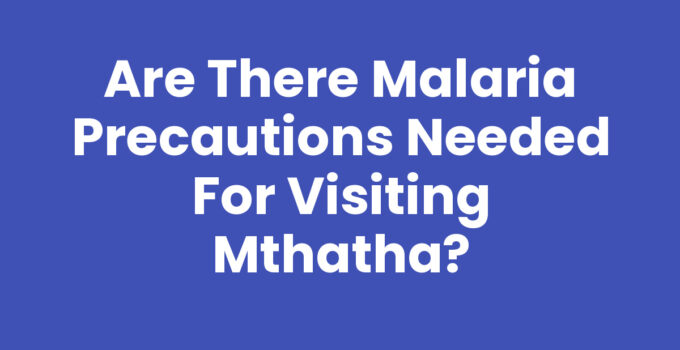Mthatha, located in the Eastern Cape of South Africa, is not only a cultural hub but also a destination that offers breathtaking scenery and rich history. However, like many parts of Africa, it raises concerns for travelers about malaria transmission. As you plan your trip, it’s crucial to know whether malaria precautions are necessary and how to protect yourself amid the excitement of exploring this unique area.
Are There Malaria Precautions Needed For Visiting Mthatha?
When planning a trip to Mthatha, travelers often wonder about the necessity of malaria precautions. The short answer is yes; it is advisable to take malaria precautions when visiting Mthatha and surrounding regions, especially if your itinerary includes rural areas or forested regions where mosquito activity is more prevalent.
Understanding Malaria Risk in Mthatha
Malaria is transmitted through the bites of infected female Anopheles mosquitoes, and its symptoms can range from mild to severe. The risk of contracting malaria in Mthatha varies depending on the time of year and your specific activities. Generally, the highest risk months are from October to May, which correspond to the rainy season in the area.
Precautions to Take
1. **Consult a Healthcare Provider:** Before traveling, it’s essential to speak with your doctor or a travel medicine specialist. They may recommend antimalarial medication, especially if you’ll be spending time in high-risk areas.
2. **Insect Repellents:** Use insect repellent containing DEET or picaridin on exposed skin and clothing. Reapply as directed, especially if you’re sweating or in high mosquito areas.
3. **Stay Indoors During Peak Mosquito Hours:** Anopheles mosquitoes are most active during dusk and dawn. Plan activities accordingly to minimize exposure during these peak times.
4. **Use Mosquito Nets:** If you’ll be staying in accommodation that isn’t well sealed, use insecticide-treated mosquito nets while sleeping. This precaution can significantly reduce the risk of mosquito bites overnight.
5. **Wear Protective Clothing:** Opt for long-sleeved shirts, long pants, and socks, especially in the evening. Light-colored clothing can make it easier to spot mosquitoes and offers some visibility on whether you are being bitten.
Read Also: Is It Safe To Pick Up Hitchhikers Near Mthatha? Considerations
Why Malaria Precautions Matter
Taking malaria precautions when visiting Mthatha can mean the difference between a healthy trip and a medical emergency. Malaria can be life-threatening if not treated promptly, resulting in complications such as severe anemia, respiratory distress, or even death. Ensuring you have the correct precautions in place will not only protect your health but also offer peace of mind while experiencing the beauty of South Africa.
Recommended Guide: What Is The Commercial Property Market Like In Mthatha
Additional Health Considerations for Travelers
While malaria is a primary concern for travelers to Mthatha, it’s also wise to consider other health precautions:
– **Vaccinations:** Make sure to be up to date on routine vaccines and any recommended vaccines for South Africa, such as hepatitis A, hepatitis B, typhoid, and tetanus-diphtheria.
– **Traveler’s Diarrhea:** Familiarize yourself with how to prevent and treat traveler’s diarrhea, a common ailment for visitors. Consider packing medications, and always drink bottled or boiled water.
– **Best Practices for Personal Safety:** Ensuring your safety also includes awareness of your surroundings. Traveling with a group, avoiding poorly lit areas at night, and keeping valuables secure can enhance your experience in Mthatha.
In conclusion, when visiting Mthatha, taking malaria precautions is not just prudent but essential for a safe and enjoyable trip. With the right preparation, you can explore the stunning landscapes and rich culture of this vibrant region without unnecessary worry.
Check This: Explore the Wsu Mthatha Campus Map: Your Ultimate Guide
Frequently Asked Questions
What is the best way to prevent malaria while traveling?
Use insect repellent, take antimalarial medication as prescribed, and wear long-sleeved clothing.
When is the malaria season in Mthatha?
Malaria risk is highest from October to May, coinciding with the rainy season.
Are there other diseases to be aware of when visiting Mthatha?
Yes, be mindful of vaccinations for hepatitis A, hepatitis B, and typhoid.









